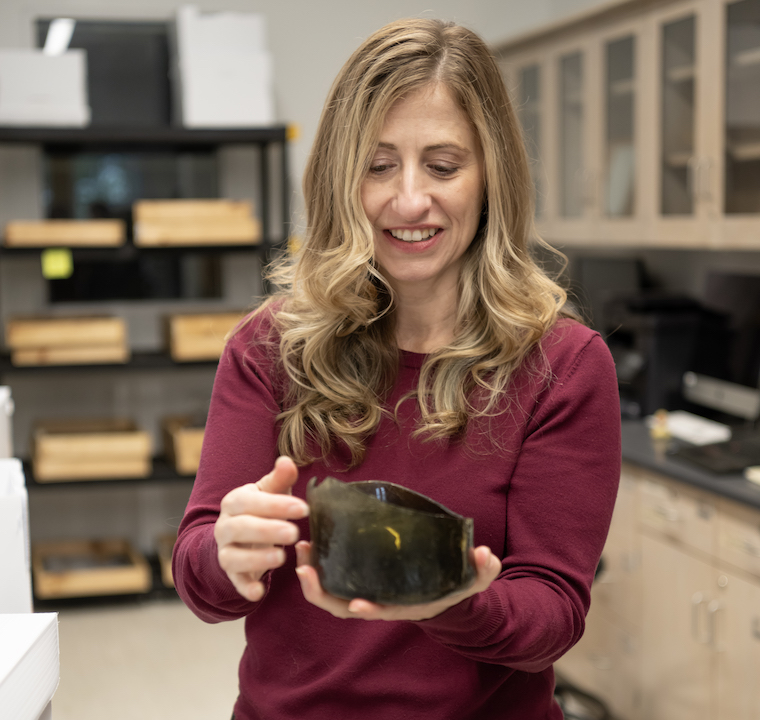Tracking Native American Cultural Heritage on Maryland’s Upper Eastern Shore
Dr. Julie Markin was recently awarded a $40k grant to conduct new archaeological work on the Upper Choptank watershed.

Dr. Julie Markin, associate professor of anthropology and archaeology and director of archaeology, was recently awarded a $40,000 grant through the Maryland Historical Trust to study the indigenous cultural heritage of Maryland’s Upper Eastern Shore and its inhabitants’ social landscapes prior to contact with European settlers and explorers. The grant will provide for an archaeological survey and excavation of the watershed, conducted by the Washington College Archaeology Lab, as well as paid internships for students, public programming and presentations, and open lab opportunities which will be open to volunteers from the public at large.
Dr. Markin’s project unites archaeological data with geographic information, environmental reconstruction and historical accounts, with the goal of developing a more robust database from which to ask questions about the nature and complexity of civilizations on the Chesapeake Bay’s Eastern Shore, an area that has historically received less study and attention than its counterpart chiefdoms across the Bay.
"The research proposed by Dr. Markin will help fill a critical gap in our knowledge about pre-contact indigenous history on Maryland’s Eastern Shore,” said Maryland Historical Trust Chief Archeaologist Dr. Matthew McKnight, who notes that most of the archaeological work in the state requires consideration of cultural resources and archaeological sites in project planning.
“In areas like the Upper Choptank watershed that have seen less development, our understanding of prehistory is much more limited than places where more publicly funded construction is taking place. We are happy to have assistance from Washington College in documenting the important resources of the region for the Maryland Inventory of Historic Properties," said McKnight.
Dr. Markin views archaeology as a means by which we can ask, and attempt to answer, when and why inequalities arise. She notes that even though the Eastern Shore received limited attention from early English settlers, mid-17th-century accounts describe Eastern Shore groups living in chiefdoms headed by hereditary leaders receiving tribute from subordinate groups. Traditional markers of complex chiefdoms – structures with status indicators and maize agriculture – are absent however, suggesting that Eastern Shore complexity has a different flavor.
“In terms of historical records, we don’t know much of what the social and economic landscape looked like before John Smith made his way to the Chesapeake and modern-day Maryland,” noted Markin. “Extensive archaeological investigation can help construct a better social geography of the Late Woodland/Contact period in the Upper Choptank.”
Six paid internships will be made available and employ students as field crew members, lab assistants, and research assistants, allowing them to gain valuable professional experience, something near and dear to Markin’s heart.
“I am very focused on applied anthropology and archaeology – giving students hands-on opportunities that contribute to the communities we engage with and that foster research that can be employed to create spaces for conversation and the development of thoughtful policies around the lands that are important to many different stakeholders, particularly descendant Indigenous groups,” said Markin.
In addition to the excavations and fieldwork, Dr. Markin has plans to develop public programming that will engage students and community volunteers in open lab sessions throughout the 2024-2025 academic year. Volunteers from the community and other regional schools will also be invited to participate in archaeological investigations conducted over the next two summers and fieldwork conducted throughout the academic year.
The grant will allow for the development of public presentations and talks to community organizations about the project and its findings as well as an exhibit at the Caroline County Historical Society building in Denton, Maryland, which would bring together project interns, the Caroline County Historical Society, and Washington College students minoring in museum, field, and community education.
“The research grant to Professor Markin is not only a testament to her stature as a scholar but also to the innovativeness of her approach to addressing important knowledge gaps,” said Washington College Provost and Dean Kiho Kim. “Moreover, with the grant, she will be able to provide students with opportunities to work on real-world problems and contribute to a better understanding of the history of this region. Such opportunities are transformative for our students. I thank Professor Markin for her dedication to her scholarly pursuits and our students.”
Those wishing to follow along with the research and find out how to participate as a volunteer are encouraged to follow the Washington College Department of Anthropology webpage and Instagram account at @wacanthropology for blogs, short videos, and updates from the field.
The Department of Anthropology & Archaeology at Washington College allows students to directly engage with contemporary anthropological topics and applied research through an individualized program that sets them up for success. Celebrating the diversity of cultural experiences and pathways students at Washington College “learn by doing” and are offered numerous opportunities for fieldwork, paid internships, and experiential learning.